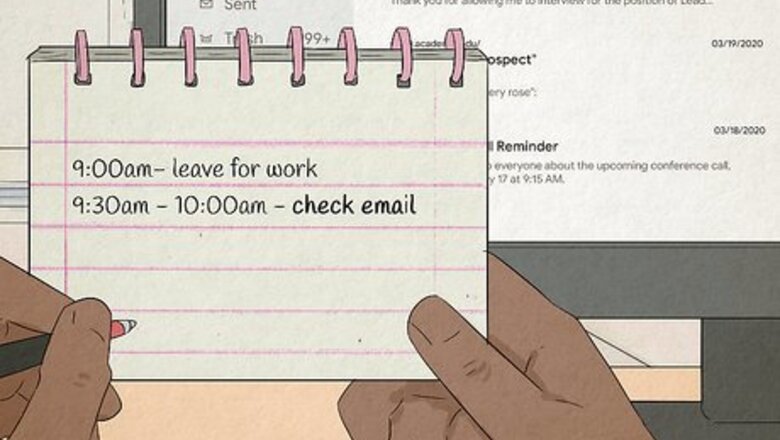
views
Organizing Your Time
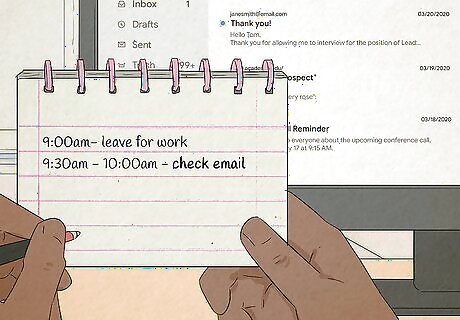
Track your time. For one or two weeks, carry a notebook or daily planner with you, and write down everything you do. Make note of how much time you spend on work, homework, entertainment, and daily tasks like sleeping and eating. Don’t try to change your habits yet. The purpose of this step is just to give you an idea of how you’re using your time right now. Be honest with yourself about how you spend your time – you can always improve your habits later. Make a point to clarify the purpose of certain tasks. For example, you may spend two hours on the internet on both Monday and Tuesday. However, Monday's time may be spent on Facebook and gaming sites, while Tuesday's time is spent learning more about the skills you need to reach your goals. Include this in your tracker so that you get a better picture of how you're using your time.
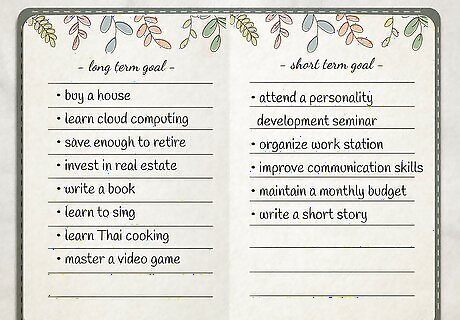
Make a list of your short and long-term goals. Look ahead to the next day, month, and year. Ask yourself what you want to get done during that time. Set both short-term and long-term goals, so you’ll know how to allocate your time and measure your progress. Take your personal goals into account, as well as external responsibilities like your career or your schoolwork. For example, your long-term goal might be to finish your degree, while your goals for today might be to attend class and finish writing a report.

Identify the time of day when you perform best. After you’ve tracked your activities for several days, look over your notes and see when you are most productive. If you are consistently able to focus best at a certain time of day, that’s probably your peak productivity window. For instance, you might find that you focus best in the morning, or you might only hit your stride when the sun is going down.

Pay attention to where you’re losing time. Look over your notes again and ask yourself if any consistent time-wasters appear. If an activity is unnecessary, doesn’t enrich your life, and doesn’t move you closer to your goals, it’s probably a time-waster. Think about how you can cut back on these activities or get rid of them completely. For example, you might realize that you procrastinate on the internet too much. To fix this, you could install an app that blocks distracting sites, or you could give yourself a shorter window for web-surfing every day.
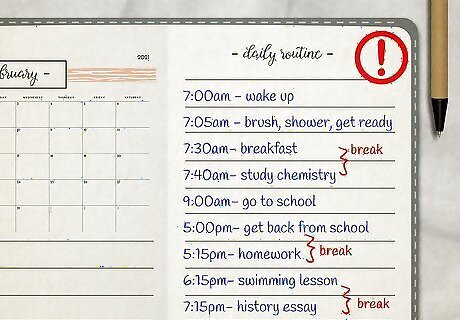
Be realistic. Keep your needs and limitations in mind as you plan your schedule. Just because something works on paper doesn’t necessarily mean you’ll be able to stick with it in real life. Ask yourself how you’ll keep your energy levels up throughout the day, and remember that you’ll need to leave small gaps in your schedule for things like eating and going to the bathroom. Stay flexible. You may need to adjust your schedule in the future.

Get inspired. Search the internet for articles on how successful people structure their days. Notice how much time they devote to work, play, and rest. Consider borrowing parts of your schedule from somebody you admire. For example, you might be inspired by someone like Benjamin Franklin, who got up at five o’clock every morning to plan the day ahead.
Managing Responsibilities
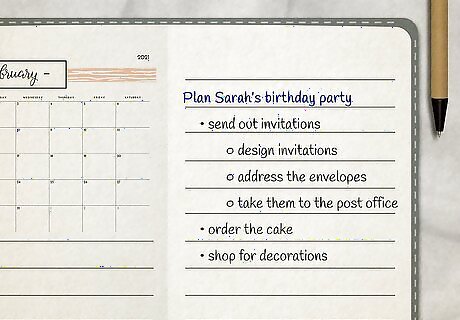
Break big tasks down into smaller tasks. This will make big tasks seem less overwhelming and easier to accomplish. For example, break down your long-term goals into smaller short-term goals. Then create a list of tasks that you need to do to reach those smaller goals. This way you can experience the accomplishment of completing each step you'll need to take to reach your ultimate goal.
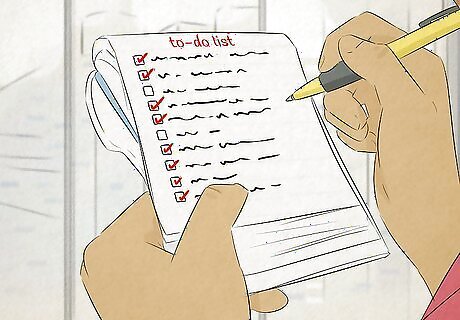
Use the 80-20 rule to work smart. The 80-20 rule states that 80 percent of results should come from 20 percent of your effort. To meet this goal, you may want to focus on what provides you with the best results and consider delegating or eliminating those tasks that seem "less urgent" or unneeded. For example, you may decide to wash your dishes every other night in order to create time to complete a task needed to meet your goal. Ask yourself these questions: Is every task on my list urgent? Are the tasks on my list within my purview or do they belong elsewhere? Am I spending too much time on certain types of tasks? Are there tasks that I should delegate? Are all of these tasks really necessary to the overall outcome?
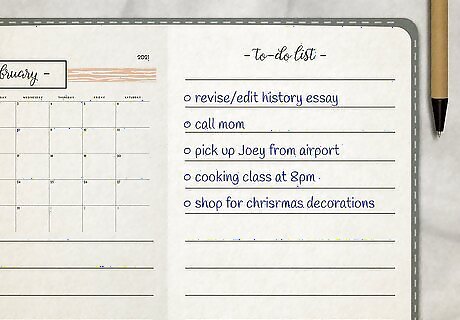
Make to-do lists. To-do lists help you keep track of all the tasks you have on your plate. It’s a good idea to have several lists: one for today, one for the week or month, and one for the whole year. This will help you maintain a big-picture view of your responsibilities without getting overwhelmed. Be thoughtful about what you put on your to-do list. Only include tasks that matter to you and that you’re prepared to actually do. Group similar tasks together to maximize your to-do list. For example, consider combining your errands. Rather than running to the store for every little item, group errands together. Three to five items is a good length for a daily to-do list.
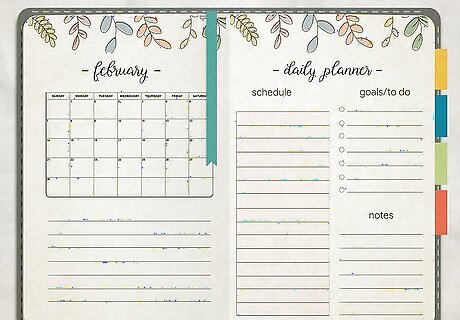
Use a planner. You can get organized and reduce your stress levels by deciding ahead of time when you’ll do specific tasks. Break your day into blocks of time, and assign activities like doing homework, answering emails, and cooking meals to certain blocks. When you write your plan down, you won’t have to expend energy trying to remember it.

Do your most important work when you feel sharpest. Arrange your schedule so that you can tackle the most important things on your to-do list during your peak productivity time. For many people, this window occurs a few hours after waking up. Obligations like classes and meetings might prevent you from working during your most productive time of day. If you can’t change your schedule, look for the second-best time of day to do your important work.

Focus on one thing at a time. Commit all your attention to one task before you move on to another. Multitasking might make you feel productive, but it actually makes you less efficient overall. If you tend to get sidetracked, look for ways to block out distractions. Close your door, put on noise-canceling headphones, or go somewhere without Wi-Fi to get your work done.
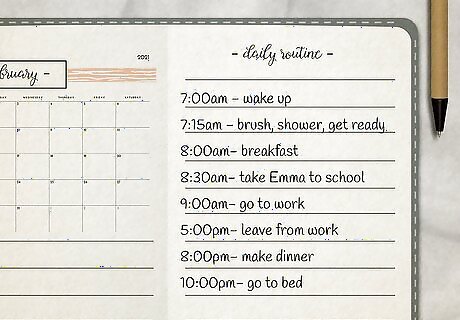
Create routines. Identify the basic tasks you need to do over and over again, like cooking or getting your kids ready for school. Come up with some efficient methods for doing these tasks, and repeat these methods until they’re a daily habit. For instance, you might want to create a new morning routine or a weekend meal prep routine. When you can do simple tasks on autopilot, you free your mind to focus on more challenging things.
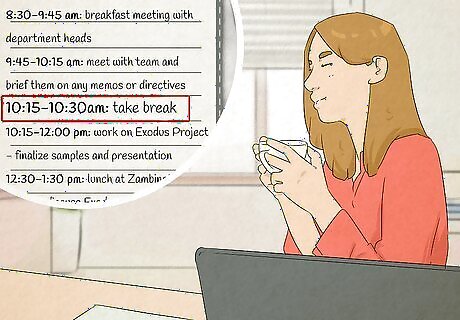
Avoid over-committing. You want to accomplish as much as possible, but doing too much can quickly overwhelm you. Rather than helping you live better, over-committing leads to burnout. Before adding new items to your planner or to-do list, ask yourself if you really have time for them. Look over your schedule to make sure you have time. Ask yourself if the new addition is worth giving up something else.
Balancing Work and Leisure

Set aside time for your loved ones. Go over your daily or weekly schedule and decide when you’ll connect with your family and catch up with friends. If you’re busy, you may find it helpful to incorporate social time into your ordinary routines. For example, you could catch up with your family every day over dinner.

Give yourself a technology curfew. It’s all too easy to waste your evening free time on gadgets like your phone or tablet, and using electronics close to bedtime can actually prevent you from getting a good night’s rest. Save time and sleep better by turning off your gadgets at least an hour before bed.

Work relaxation into your schedule. Personal time is important to your overall health and happiness, so prioritize it just like you would work or school. Think about what you need to feel refreshed and recharged every day. Then block off time for it in your planner. For instance, you could get up twenty minutes earlier every morning to meditate, or you could set aside Sunday evenings to work on a hobby.

Make time for your health. Give yourself at least seven hours to sleep every night, as well as a few hours a week to exercise and prepare nutritious food. Staying healthy helps you function better in every area of life. You’ll also enjoy a better quality of life years down the road if you take care of your health now.




















Comments
0 comment